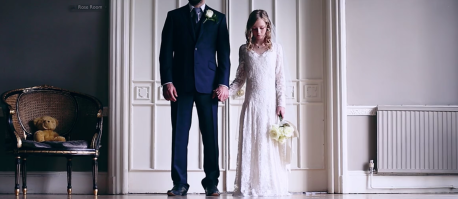
Iliana's Story: Their Universal Truth
In December 2016, I was asked to think about my UNICEF story, why I initially got involved with the organization, and why I continue to donate my time and efforts to support this cause. At first, it was difficult. I couldn’t pinpoint one instance or one particular memory that triggered my love for UNICEF. There were so many. So, I went back and recounted my six years of being involved with this organization and the many moments that have changed my life since. As I reminisced, I kept coming back to what I know is the foundation of my motivations: my parents. It’s their stories, difficult childhood realities, and inspiring journeys that have solidified what I feel is my unconditional and very personal calling to help children and families across the world.
My mother was born in Colombia and my father was born in El Salvador. Despite growing up in two completely different countries separated by over 1,000 miles of land and water, they both experienced the effect of war and government corruption (eg poverty, violence, and lack of security, safety, education, and resources) in their respective countries, particularly throughout the 1970s and 1980s.
From 1979-1992, El Salvador experienced it’s most violent and murderous civil war. An estimated 70,000 people were killed during this time. Despite knowing this piece of history, it hadn’t occurred to me that my father’s immigration to the United States was directly linked the 1980s Salvadoran Civil War until I heard him tell the story this past December 2016.
We were gathered at a family friend’s for New Year’s Eve, eating tamales and other traditional holiday foods. My father and our friends reminisced and laughed while telling their childhood stories, from running and playing soccer down dusty roads to swimming with other kids in the river. They smiled as they thought about how beautiful El Salvador was back then; how peaceful and festive they remember it.
Then, one of our friends asked my father, “How did you come to los Estados Unidos?” He explained that when thousands of Salvadorans fled repression during the war; he had two options at age 15: 1) to join the military or 2) follow his brother to the US for a chance at life. He wouldn’t tell us exactly the things he saw back then, before choosing to seek refuge in the United States, but my mother now tells me that the few images he’s kept are ones you can never forget.
So, my father travelled to the United States. Upon his arrival, he learned that the government had passed legislation that allowed the president to grant refugees from El Salvador and Guatemala, in need of a safe haven, with Temporary Protected Status (TPS), which led to my father’s now citizenship here.
This was the very first time I realized my father was a refugee. At age 25 and having spent years advocating and fundraising for UNICEF’s work in regards to the refugee crisis, it was in that moment that I discovered that not only am I the daughter of two immigrants, but I am also the daughter of a refugee. I hadn’t known that this cause is also very personal to my family and me - as it is for millions of families worldwide.
Refugees do not look a certain way. They don’t practice a particular faith or come from one place.
However, their universal truth is that they are human. They are children, mothers, sisters, brothers, and fathers. They are people. And, they need our help. The world is looking to ordinary people, like you and I, to spread awareness, raise funds, and urge our governments, near and far, to take a stand. The world needs its community of global citizens to advocate on their behalf. The children of the world deserve it. They deserve that and so much more.
-Written by Iliana Alveranga, NextGen Chicago Steering Committee member
HOW TO HELP
There are many ways to make a difference
War, famine, poverty, natural disasters — threats to the world's children keep coming. But UNICEF won't stop working to keep children healthy and safe.
UNICEF works in over 190 countries and territories — more places than any other children's organization. UNICEF has the world's largest humanitarian warehouse and, when disaster strikes, can get supplies almost anywhere within 72 hours. Constantly innovating, always advocating for a better world for children, UNICEF works to ensure that every child can grow up healthy, educated, protected and respected.
Would you like to help give all children the opportunity to reach their full potential? There are many ways to get involved.





